

New "Senolytic" Drugs Can Dramatically Increase Healthy Lifespan. Designing A Better Death. The world's population is aging.

The World Health Organization estimates that by 2050, the proportion of people 60 years or older in the world will have doubled, from 11% in 2000 to 22% (2 billion people) in 2050. This makes services for the elderly, like hospice care, which seeks to ease the pain (physical and emotional) of terminally ill patients and their families in their last days, even more important. The problem is, we tend to avoid talking about death and dying, and people don't always make plans in advance for end-of-life care. And as it stands, today's hospice care system can be can be impersonal, under-resourced and under-staffed, and plagued with communication issues between care workers, patients, and families. Harvard researchers find protein that could reverse the aging process.
Researchers from the Harvard Stem Cell Institute (HSCI) have shown that injections of a protein dubbed GDF11, when administered to older mice, appear to cause a reversal of many signs of aging.
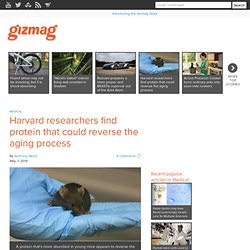
Analysis showed that every major organ system tested displayed signs of improvement, with the protein even appearing to reverse some of the DNA damage which is synonymous with the aging process itself. The protein GDF11 is found in humans as well as mice, and is now being considered for possible human testing due to its surprising and apparently regenerative properties. A previous study had focused on examining the hearts of mice the equivalent of 70 human years old.
The mice were regularly exposed to the blood of younger mice whose blood carried a higher concentration of GDF11. Melatonin appears to stop bone loss in older rats. Melatonin supplements can make bones stronger in older rats, which suggests melatonin might fight bone loss in people, too.

Researchers gave 22-month-old male rats (the equivalent of 60 year-old humans) melatonin supplements diluted in water for 10 weeks (the equivalent of six years in human years). The femurs taken from the elderly rats that had received the melatonin supplements were then compared with those of a control group (which had not received the supplements) using a series of tests to measure bone density and strength. The researchers found that there was a significant increase in both bone volume and density among the rats that had received melatonin supplements.
As a result, it took much more force to break the bones of rats that had taken the melatonin supplements; a finding that suggests to the researchers that melatonin may prove a useful tool in combating osteoporosis. Lifestyle Changes May Lengthen Telomeres, A Measure of Cell Aging. A small pilot study shows for the first time that changes in diet, exercise, stress management and social support may result in longer telomeres, the parts of chromosomes that affect aging.
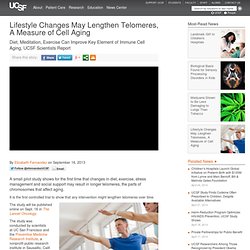
It is the first controlled trial to show that any intervention might lengthen telomeres over time. The study will be published online on Sept. 16 in The Lancet Oncology. The study was conducted by scientists at UC San Francisco and the Preventive Medicine Research Institute, a nonprofit public research institute in Sausalito, Calif. that investigates the effect of diet and lifestyle choices on health and disease. The researchers say they hope the results will inspire larger trials to test the validity of the findings. “Our genes, and our telomeres, are not necessarily our fate,” said lead author Dean Ornish, MD, UCSF clinical professor of medicine, and founder and president of the Preventive Medicine Research Institute.
Supercentenarian's Blood Provides Clues To Extending Human Life. Researchers Clone Stem Cells From Human Adults. This is awesome.
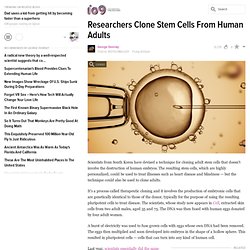
Now we can finally start to leave the ethical debate around stem cell treatments behind, and finally get people the help they need. There is no ethical debate, at least amongst people that understand ethics; it is similar to the evolution/creationism issue in that the issue is manufactured. I agree with Ziggy, however: there will be some controversy made about this. Scientists develop an 'elixir' that reverses a known cause of aging. Regeneration of the aged thymus by a single transcription factor. + Author Affiliations + Author Notes ↵* Present address: Wellcome Trust - Medical Research Council Stem Cell Institute, University of Cambridge, Tennis Court Road, Cambridge CB2 1QR, UK. ↵‡ Present address: Ecole Polytechnique Fédérale de Lausanne, Swiss Institute for Experimental Cancer Research, Lausanne CH-1015, Switzerland.
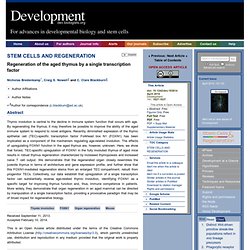
↵§Author for correspondence (c.blackburn@ed.ac.uk) Harvard team successfully reverses the aging process in mice. Harvard scientists reverse the ageing process in mice – now for humans. Scientists claim to be a step closer to reversing the ageing process after rejuvenating worn out organs in elderly mice.
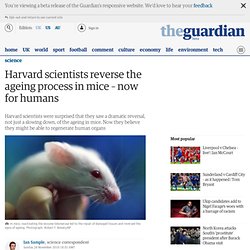
The experimental treatment developed by researchers at the Dana-Farber Cancer Institute, Harvard Medical School, turned weak and feeble old mice into healthy animals by regenerating their aged bodies. The surprise recovery of the animals has raised hopes among scientists that it may be possible to achieve a similar feat in humans – or at least to slow down the ageing process. An anti-ageing therapy could have a dramatic impact on public health by reducing the burden of age-related health problems, such as dementia, stroke and heart disease, and prolonging the quality of life for an increasingly aged population.
Harvard team successfully reverses the aging process in mice. Hydrogel could dispense pain-killing medicine to joints as they move. Lead scientist Xinqiao Jia works with the gel Image Gallery (2 images) People suffering from joint problems such as osteoarthritis tend to take a lot of anti-inflammatory drugs, even though such medications affect their whole body, all of the time.

Scientists at the University of Delaware, however, are developing what could be a more effective alternative. Www.un.org/esa/population/publications/worldageing19502050/pdf/90chapteriv.pdf. Population pyramids for 2000 and 2050. Population by age, sex and educational attainment. Population Pyramids of the World from 1950 to 2100 — PopulationPyramid.net. Bioengineer: the heart is one of the easiest organs to bioprint, we'll do it in a decade.
A team of cardiovascular scientists has announced it will be able to 3D print a whole heart from the recipients' own cells within a decade.
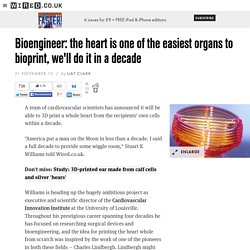
"America put a man on the Moon in less than a decade. I said a full decade to provide some wiggle room," Stuart K Williams told Wired.co.uk. Don't miss: Study: 3D-printed ear made from calf cells and silver 'hears' Williams is heading up the hugely ambitious project as executive and scientific director of the Cardiovascular Innovation Institute at the University of Louisville.
RIBA Examines How Over 60s Might Impact Future Cities. According to the Royal Institute of British Architects (RIBA), the number of people aged over 60 is expected to increase by 40% over the next twenty years, suggesting that “our post-retirement years will be longer and healthier.”

There is no doubt, therefore, that people in this age group will have a greater economic, social and political power – but how will this affect our cities? RIBA’s think tank, Building Futures, has published a report envisaging a future in which people may choose “luxurious, international retirement lifestyles” or “live with their families in one grand design.” It suggests that “our beleaguered high streets could take on a new lease of life, with health hubs, child care facilities, universities and coastal towns, traditionally favored by older generations but currently facing big social and economic challenges, could all be transformed by a more active retired population.”
As part of the report, Building Futures suggests six possible scenarios for our cities: Aging America: The Cities That Are Graying The Fastest. Aging nations and the future of cities. Partial gene knockout produces long-lived mice. Researchers at the National Institutes of Health have found that suppressing the expression of a single gene in mice extends their average lifespan by about 20 percent – the equivalent of humans living an average of 95 years. While modification of the so-called mTOR gene may not lead to the fountain of youth, further study could open up a path to keeping us healthier and more alert in our old age.
The findings of the NIH study indicate that the median lifespan of the wild-type mice was 25.4 months, compared to 30.3 months for the mTOR-suppressed mice, an increase of over 19 percent. The maximum lifespan of the mTOR-suppressed mice was increased by about 12 percent, to about 1.5 times the median lifespan of the wild-type mice. In human terms, this would correspond to nearly 120 years of age, which is getting close to the 122 years survived by Jeanne Calment, the oldest human on (reliable) record. Download.cell.com/cell-reports/pdf/PIIS2211124713003926.pdf?intermediate=true. Living to 120 and Beyond: Americans’ Views on Aging, Medical Advances and Radical Life Extension. With falling birthrates and rising life expectancies, the U.S. population is rapidly aging. By 2050, according to U.S. Census Bureau projections, one-in-five Americans will be 65 or older, and at least 400,000 will be 100 or older.
Some futurists think even more radical changes are coming, including medical treatments that could slow, stop or reverse the aging process and allow humans to remain healthy and productive to the age of 120 or more. The possibility that extraordinary life spans could become ordinary life spans no longer seems far-fetched. A recent issue of National Geographic magazine, for example, carried a picture of a baby on its cover with the headline: “This Baby Will Live To Be 120.”
Germany maps out clear vision on ageing population as Hong Kong struggles. Brigitte Dersch retired from her engineering job five years ago and, at the age of 70, she says she has little to fear from the future. She enjoys dancing with her friends in the studio of a "creative home" that is funded by the German government to encourage more interaction between the generations. She lives off a monthly state pension of about €1,200 (HK$12,100) and enjoys socialising at the home while living independently. As well as providing good exercise, it also gives her the chance to do volunteer work, performing at homes for the elderly and sending a positive message to other retirees that elderly people can still be active. "I enjoy getting an emotional response from the audience and making them happy," she said. Can a Jellyfish Unlock the Secret of Immortality? Heart ‘wear and tear’ looks like Alzheimer’s. UNC-CHAPEL HILL (US) — There are striking similarities between heart cells in patients with heart failure and brain cells in patients with Alzheimer’s disease, report scientists.
The findings raise the possibility that some treatment approaches in development for Alzheimer’s may also help reverse the damage from heart failure. Despite a substantial increase in the number of people suffering the debilitating and often deadly effects of heart failure, treatments for the condition have not advanced significantly for at least 10 years.
“We know that Alzheimer’s is a process of wear and tear on the brain, and the same sort of wear and tear affects the heart,” says Cam Patterson, chief of cardiology at University of North Carolina School of Medicine. Researchers restore hearing in mammals by regenerating auditory hair cells. Solving the mystery of ageing. Hydra's immortality gene sheds light on human ageing. Aging Japanese Town Bets on a Young Mayor. My Faith-Based Retirement. Twin study isolates key ageing genes. Another breakthrough in the ever accelerating quest to extend human lifespan has seen researchers identify key genes associated with ageing. By studying these "ageing" genes, which are switched on or off by external factors such a diet and lifestyle, it's hoped that the biological mechanisms of ageing can be better understood.
In a study at Kings College London using groups of identical twins, genes were identified that are switched on or off by epigenetic factors - natural mechanisms other than the underlying DNA which change the gene expression, and could include external factors such as diet and environment. Adult stem cells used to induce the natural hair growth cycle in hairless mice. A previously hairless mouse following an implantation of bioengineered hair follicles recreated from adult tissue-derived stem cells Image Gallery (15 images) Researchers lead by Professor Takashi Tsuji from the Tokyo University of Science have successfully induced the natural hair growth and loss cycle in previously hairless mice.
Diet of buckyballs nearly doubles rat lifespan. WOW - Wider Opportunities For Women - More Info. The Future: No Lattes, No Movies. Immortal’ worms use trick to beat aging. JRF challenges society to think differently about ageing.